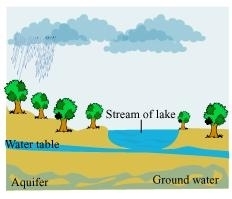NCERT Solutions for Class 7 Science Chapter 16 Water: A Precious Resource
Exercise : Solutions of Questions on Page Number : 203
Q1 : Mark ‘T’ if the statement is true and ‘F’ if it is false:
(a) The freshwater stored in the ground is much more than that present in the rivers and lakes of the world. (T/F)
(b) Water shortage is a problem faced only by people living in rural areas. (T/F)
(c) Water from rivers is the only source for irrigation in the fields. (T/F)
(d) Rain is the ultimate source of water. (T/F)
Answer :
(a) The freshwater stored in the ground is much more than that present in the rivers and lakes of the world. (T)
(b) Water shortage is a problem faced only by people living in rural areas. (F)
(c) Water from rivers is the only source for irrigation in the fields. (F)
(d) Rain is the ultimate source of water. (T)
Q2 : Explain how groundwater is recharged.
Answer :
Rain water and the water from water bodies on earth’s surface pass through the soil by the process of infiltration. The infiltrated water then gets accumulated in the aquifer deep under the ground. There are some layers of impermeable rocks which prevent the water in the aquifer from seeping down further.
In this way, the ground water is recharged.
Q3 : There are ten tube wells in a lane of fifty houses. What could be the long term impact on the water table?
Answer :
If the people of the fifty houses use the ten tube wells, then the water required by them is drawn from the ground. If these tube wells are used for long time, then the ground water would be reduced and the water table would go down.
Q4 : You have been asked to maintain a garden. How will you minimise the use of water?
Answer :
To maintain a garden, water is necessary. Therefore, to minimise the use of water, we can apply the drip irrigation method. In this method, water is supplied directly to the base of the plants using narrow pipes, thereby reducing the loss of water.
Q5 : Explain the factors responsible for the depletion of water table.
Answer :
The factors responsible for the depletion of water table are as follows:
(i)Increasing population
As a result of increasing population, all the facilities such as houses, shops, roads, offices, pavements, etc. increase to fulfil the increasing demands. This, in turn, decreases the open area for seepage of water into the ground.
(ii)Increasing industries
Most of the stages of manufacturing processes in industries require water. If the number of industries increases, then the water required by them will also increase. Therefore, increase of industries contributes to the depletion of water table.
(iii)Agricultural activities
India is an agricultural country and agriculture is impossible without water. The water for agriculture is mainly utilised from ground water, rain water and canal water. As there is no rainfall in many places, agriculture cannot be entirely depended on rain water. Also, canal water is available in a few places only. Therefore, ground water is the main source of water for agricultural activities and this causes depletion of water table.
Q6 : Fill in the blanks with the appropriate answers:
(a) People obtain groundwater through _______ and ________.
(b) Three forms of water are ________, ________ and ________.
(c) The water bearing layer of the earth is ________.
(d) The process of water seepage into the ground is called ________.
Answer :
a) People obtain groundwater through __tube wells__ and __hand pumps__.
(b) Three forms of water are __ice__, __water__ and __vapour__.
(c) The water bearing layer of the earth is __aquifer__.
(d) The process of water seepage into the ground is called __infiltration__.
Exercise : Solutions of Questions on Page Number : 204
Q7 : Which one of the following is not responsible for water shortage?
(i) Rapid growth of industries
(ii) Increasing population
(iii) Heavy rainfall
(iv) Mismanagement of water resources
Answer :
(iii) Heavy rainfall
Q8 : Choose the correct option. The total water
(i) in the lakes and rivers of the world remains constant.
(ii) under the ground remains constant.
(iii) in the seas and oceans of the world remains constant.
(iv) of the world remains constant.
Answer :
The total water
(iv) of the world remains constant.
Q9 : Make a sketch showing groundwater and water table. Label it.
Answer :

Ground water and water table